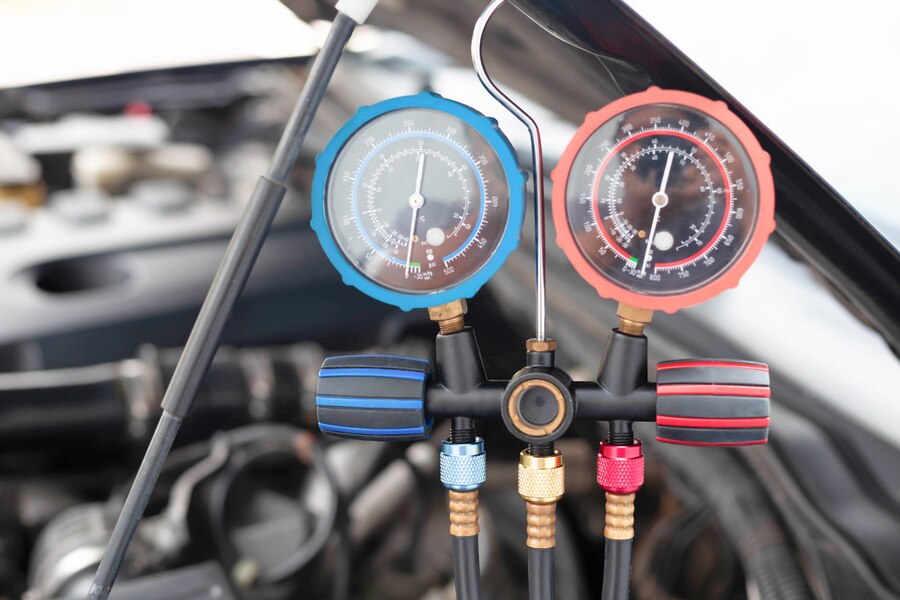Which Gas is Used in Car AC? A Comprehensive Guide to Car AC Refrigerants

When it comes to comfort during your car rides, knowing which gas is used in car AC systems is fundamental. The type of Car AC refrigerant used affects both the cooling performance and environmental impact of your vehicle. Understanding different Car AC gas types and their specific attributes ensures you make the best decision for performance and eco-friendliness.
Car air conditioning relies on an intricate process where refrigerants transfer heat, enabling the car’s interior to cool down efficiently. Selecting the right AC gas in vehicles requires knowledge of its effectiveness, safety, and compliance with regulations. This detailed guide will explain the types of refrigerants used in car air conditioning, their pros and cons, and why making an informed choice is crucial for both your car and the environment.
Understanding Refrigerants in Car ACs
Refrigerants are the lifeblood of car AC systems, facilitating the cooling process through a continuous cycle of compression, condensation, expansion, and evaporation. The question of which gas is used in car AC is vital for maintaining this cycle effectively. Here’s how it works:
- Compression Stage: The Car AC refrigerant is compressed into a high-pressure, high-temperature gas by the AC compressor.
- Condensation Stage: The hot, pressurized gas passes through the condenser coils, cooling down and converting into a high-pressure liquid while releasing heat outside.
- Expansion Stage: The liquid refrigerant moves through an expansion valve or orifice tube, causing a drop in pressure and temperature.
- Evaporation Stage: Inside the evaporator coils, the refrigerant absorbs heat from the car’s cabin, evaporates into a low-pressure gas, and cools the air.
The cycle repeats, allowing the Car AC gas type to maintain a continuous cooling process. Selecting the right refrigerant used in car air conditioning is essential for the system’s efficiency and environmental safety.
Common Types of Refrigerants Used in Cars
When discussing which gas is used in car AC, it’s important to understand the types of Car AC gas types available and their properties:
- R134a (Tetrafluoroethane):
- Widely adopted since the 1990s.
- Pros: Non-flammable, stable, commonly available, and safe for use in various climates.
- Cons: Moderate Global Warming Potential (GWP), contributing to greenhouse gas emissions. Newer regulations are encouraging a shift towards more sustainable options.
- R1234yf (Tetrafluoropropene):
- A modern, eco-friendly alternative that meets stricter environmental standards.
- Pros: Low GWP, environmentally compliant, widely adopted in newer car models.
- Cons: Generally more expensive compared to older refrigerants like R134a.
- R12 (Dichlorodifluoromethane):
- Commonly used in older vehicles before being banned for its high ozone-depleting properties.
- Pros: Effective cooling performance.
- Cons: High ozone depletion potential, which led to its phase-out under the Montreal Protocol.
- R290 (Propane):
- A natural refrigerant that offers a very low GWP and is non-toxic.
- Pros: Highly efficient, environmentally friendly, and sustainable.
- Cons: Highly flammable, requiring meticulous handling and installation.
- R32 (Difluoromethane):
- Gaining popularity as a replacement for R410A due to its lower GWP.
- Pros: Improved energy efficiency and reduced environmental impact.
- Cons: Mildly flammable, which necessitates careful handling and specialized installation.
Why Selecting the Right Gas Matters
Understanding which gas is used in car AC is vital for several reasons:
- Environmental Impact: Refrigerants with a high GWP contribute to climate change. For instance, R134a has a significant GWP, while R1234yf and R290 are better choices for eco-conscious drivers.
- Performance and Efficiency: The appropriate Car AC gas type ensures your AC system maintains optimal cooling efficiency without putting undue stress on the components.
- Regulatory Compliance: Using banned or non-compliant refrigerants, like R12, could lead to fines and the need for costly system overhauls.
How to Check Which Gas Your Car AC Uses
To find out which gas is used in car AC, follow these steps:
- Owner’s Manual: Your car’s manual is the primary source for details on the recommended Car AC refrigerant.
- Labels Under the Hood: Most vehicles have a label near the AC system or compressor, clearly stating the AC gas type.
- Professional Consultation: If you’re unsure or if your car has undergone modifications, consult a certified mechanic to confirm the correct refrigerant used in car air conditioning.
Best Practices for Car AC Maintenance
Maintaining your car’s AC system not only ensures comfort but also extends the system’s lifespan. Here are some essential tips:
- Regular Inspections: Periodically inspect your AC system for any potential leaks or performance issues that could lead to refrigerant loss.
- Use the Right Gas: Always top up or refill with the recommended Car AC gas type to maintain optimal cooling performance. Using the wrong AC gas in vehicles can lead to inefficiencies and potential damage.
- Professional Servicing: Schedule annual maintenance checks to ensure your AC system is running at peak performance and to spot any early signs of wear and tear.
- Clean the System: Keep the evaporator and condenser coils clean to prevent blockages and maintain effective heat exchange.
- Monitor Refrigerant Levels: Low levels of Car AC refrigerant can strain the compressor, leading to potential breakdowns.
Eco-Friendly Choices and Future Trends
With increasing environmental concerns, the automotive industry is shifting towards more sustainable AC gases in vehicles. Current trends include:
- Adoption of Low GWP Refrigerants: Refrigerants like R1234yf and R32 are becoming standard due to their reduced impact on the environment.
- Innovative Technologies: Car manufacturers and HVAC companies are developing new technologies that focus on zero-emission refrigerants to align with global climate goals.
- Legislation and Compliance: Stricter environmental regulations mean that car owners and manufacturers need to stay informed about which refrigerants used in car air conditioning are permitted.
Choosing the right Car AC refrigerant contributes not only to your vehicle’s efficiency but also to global sustainability. Understanding which gas is used in car AC systems and selecting eco-friendly options helps reduce your carbon footprint while maintaining comfort.
Signs Your Car Needs an AC Gas Refill or Service
Maintaining optimal levels of Car AC refrigerant is crucial for ensuring your car’s air conditioning system performs effectively. Here are common signs that indicate your car may need an AC gas refill or service:
- Reduced Cooling Efficiency: If the air from your AC vents isn’t as cold as it used to be, this could signal that the refrigerant levels are low.
- Unusual Noises: A loud or strange noise coming from the AC system may indicate that the compressor is struggling due to low refrigerant levels.
- Foul Odors: Musty or foul smells when the AC is running can point to issues within the system, potentially involving refrigerant leaks.
- Visible Leaks: Oily residue on or around the AC components can indicate a refrigerant leak, which should be checked and fixed promptly.
- Erratic Performance: If your AC is blowing cool air inconsistently, this could mean the Car AC gas type is low and needs a top-up.
Tips for Extending the Life of Your Car’s AC System
Keeping your Car AC gas type well-maintained ensures longer-lasting performance and prevents costly repairs. Here are some practical tips:
- Run Your AC Regularly: Even during colder months, running your AC for a few minutes each week helps keep the system’s components lubricated and prevents seals from drying out.
- Use the AC Recirculation Mode: This mode reduces the load on the AC by cooling the already chilled air within the car, thereby conserving Car AC refrigerant.
- Keep Your Cabin Clean: Dust and debris can clog the air intake vents, affecting the AC’s performance and potentially leading to overworking the system.
- Check for Leaks: Regularly inspect the AC hoses and connections for signs of wear or leakage, as catching issues early can prevent a complete system breakdown.
- Maintain Coolant Levels: Ensure that the right refrigerant used in car air conditioning is at appropriate levels. Regular checks help maintain efficiency and prevent the compressor from straining.
Conclusion
Choosing which gas is used in car AC systems is a significant decision that impacts cooling efficiency, safety, and environmental responsibility. Staying informed about the type of refrigerants used in car air conditioning and keeping up with eco-friendly advancements ensures your vehicle remains efficient and compliant with modern standards.
Call to Action
For expert car AC maintenance and reliable service, turn to KwikFix Auto. We offer comprehensive solutions to keep your vehicle’s AC performing at its best. Contact us today or download the KwikFix Auto app for easy booking and trustworthy service to ensure your car stays cool and comfortable all year round.
Frequently Asked Questions
Q1. Which gas is used in car AC today?
A1. Most new car models use R1234yf due to its lower environmental impact and compliance with regulations, while R134a is still prevalent.
Q2. What happens if I use the wrong refrigerant?
A2. Using an incorrect Car AC gas type can cause reduced efficiency, damage to the AC system, and potential safety issues.
Q3. Is R12 still used in vehicles?
A3. No, R12 has been globally banned due to its high ozone-depleting potential. It has been replaced by more eco-friendly options.
Q4. Why is R290 considered eco-friendly?
A4. R290 (propane) has a very low GWP and is non-toxic, making it a safe and sustainable choice for car AC systems, despite its flammability.
Q5. What should I do if my refrigerant type is banned?
A5. If your car uses a banned refrigerant, consult a professional to retrofit your AC system for compatibility with newer, compliant Car AC gas types.
Q6. Is R32 safe to use in cars?
A6. Yes, R32 is safe and offers better energy efficiency, but it requires careful handling due to its mild flammability.
Q7. How often should I refill my car AC gas?
A7. Only refill when necessary, such as when the cooling performance drops or during routine maintenance. Overfilling can damage the system.
Q8. Can I switch refrigerants in my car?
A8. Yes, but switching to a different Car AC refrigerant involves system modifications, including the replacement of specific components, and should be done by a professional.
Related Articles
AC Not Working in Car | Car AC Coil Replacement Cost | How to Use Car AC | Car AC Problems | Car AC Cleaner Foam | Car AC Evaporator Cleaner | AC Switch for Car | Cost of Replacement Electric Car Batteries | Is Apollo Tyre Good | Apollo Tyres vs MRF Tyres





